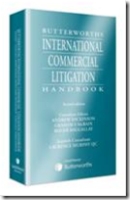 The aim of the Butterworths International Commercial Litigation Handbook is to be a repository of "United Kingdom primary and secondary legislation, with key European Community and international materials" relating to international commercial disputes before the courts in England, Wales and Scotland. Publication details and a table of contents can be found in the earlier news item.
The aim of the Butterworths International Commercial Litigation Handbook is to be a repository of "United Kingdom primary and secondary legislation, with key European Community and international materials" relating to international commercial disputes before the courts in England, Wales and Scotland. Publication details and a table of contents can be found in the earlier news item.
The frenzy of legislative activity, both on a national and European level, in recent years means that Butterworths have had to squeeze a lot of information into a relatively small amount of space. The breadth of material the editorial team has managed to include in the Handbook, however, is to be welcomed; private international lawyers will find their needs almost comprehensively satisfied. The materials are grouped into five Parts: Statutes; Civil Procedure Rules; Statutory Instruments; EC Materials, and Other International Materials. Each Part is again sub-divided into several categories, so that Jurisdiction and Foreign Judgments are dealt with separately from Applicable Law, as well as Arbitration, Carriage by Sea, Cross-Border Insolvency, Service of Documents, and so on.
This grouping of legislation can feel somewhat counter-intuitive if one is focusing on a particular area: the Contracts (Applicable Law) Act 1990, for example, can be found at para. [182], whilst the 1980 Rome Convention to which the 1990 Act gives effect doesn't appear until para. [3205]. Fortunately, the publishers have preempted this problem by using coloured "tabs" for each Part, which appear both on the pages themselves and, crucially, when the Handbook is shut, thus giving you a good idea where the relevant text is located at any given time.
Another key feature is the inclusion of "Notes" that appear periodically throughout every Act or Instrument. These often simply cite changes to the legislative text, the date on which the relevant legislation came into force, or helpfully cross-reference to another part of the Handbook. More significantly, they also occasionally provide updates on the possible future of particular legislation – the note appended to the Contracts (Applicable Law) Act 1990, for instance, cites the proposed "Rome I" Regulation, and where on the internet you can find it, along with the UK's current opt-out position. The only limitation to such an excellent service is a by-product of the chapter structure implemented (as noted above): the note appended to the 1980 Rome Convention, at para. [3205] in the EC Materials section, makes no mention of the proposed "Rome I" Regulation. This would perhaps be where one would expect to find it, rather than alongside the 1990 Act in the Statutes section of the Handbook. This is, however, a small point – practitioners and academics familiar with the text of the legislation will find little difficulty in extracting the pertinent information from the Handbook.
The Handbook also includes a number of Tables, in Part V, on Other International Materials. These identify, inter alia, the date on which the various Brussels and Lugano Conventions came into force, as well as the Brussels I Regulation, in each Member State of the EC, and the complete list (and entry into force dates) of those countries party to the 1958 New York Convention on the Recognition and Enforcement of Arbitral Awards. The same service is also repeated for the Service Regulation, the 1965 Hague Convention on Service Abroad of Judicial Documents, and the 1970 Hague Convention on the Taking of Evidence Abroad. These tables represent an impressive, and useful, collection of statistics that will appeal to practitioners and academics alike.
Overall, the Handbook is a well put-together, comprehensive sourcebook of key legislation in the field of international commercial litigation. It is an essential text for practitioners who want all the relevant materials contained within one volume, and a useful addition to any university law library.
Butterworths International Commercial Litigation Handbook can be bought from the CONFLICT OF LAWS .NET secure, Amazon-powered bookshop.
